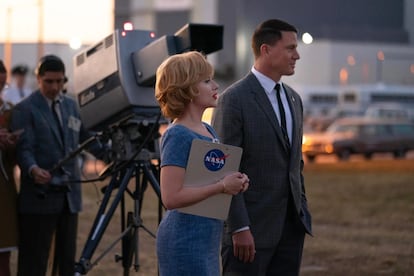Scarlett Johansson’s new film flops, prompting Apple to rethink its strategy
After spending $20 billion on productions since 2019 and racking up millions in losses, the technology company has been forced to change its plan to cut costs. As a result, it will only give the latest movie by George Clooney and Brad Pitt a limited theatrical release


The romantic comedy Fly Me to the Moon, starring Scarlett Johansson, cost a whopping $100 million. To put that into perspective, the rom-com hit Anyone But You cost around $25 million. The budget blew out due to the star actress’ huge salary and the fact that the movie was set in the middle of the NASA space race (not a big draw card for young audiences). And now reality is setting in. The film has barely grossed $40 million, and has been crowned one of the biggest financial flops of the summer. It’s resulted in hundreds of millions in losses, yet another blow to Apple’s short career in the cinema.
Since it began releasing original TV series and films in 2019, Tim Cook’s tech giant has spent around $20 billion on Apple productions, journalist Lucas Shaw recalled in a report in Bloomberg. In Silicon Valley, they have never skimped on expenses or stars. In the past five years, they have hired Martin Scorsese, Ridley Scott, Joaquin Phoenix, Leonardo DiCaprio, Chris Evans, Ana de Armas, Sofia Coppola, Gary Oldman, Will Smith, Jared Leto, Ryan Reynolds, Harrison Ford and Nicole Kidman. But the company is starting to think that the extra costs must end, with the bad publicity forcing the company to look for a new strategy.
The first question is: was Apple’s foray into the audiovisual industry necessary? “Yes, it is not limited to being a technology company that sells products, it is a service company; many of them are deeply linked to the arts. The world of cinema was a natural step,” says company expert Víctor Abarca. The company, he says, “has always been linked to culture. With Steve Jobs, music was a central pillar, and now, with the iPad or the Apple Vision Pro glasses, it is reasonable that it offers content with high production standards.”
On the other hand, there was the competitive logic, recalls Fernando del Moral, the head of La Manzana Mordida, a Spanish website on Apple news: “The business had to be diversified beyond hardware, because the mobile market is mature, and they had to look for new sources of income. Streaming and subscriptions are an area with growth potential, and they did not want to be left out of the war. Having their own series would retain users, give them value and loyalty.”
Apple’s strategy to attract so many big names was always money. Jennifer Aniston and Reese Witherspoon earned a million per episode in the first season of The Morning Show. Bloomberg reported that their salary doubled in the fourth season, and that Apple spends $50 million just on paying the cast, which includes Jeremy Irons and Marion Cotillard.
Some critics say that Tim Cook was perhaps attracted by the idea of being photographed with celebrities at every Hollywood party, going to Cannes... imitating Amazon founder Jeff Bezos. But Abarca believes it is about the brand’s image: “Apple’s strategy is to continue surrounding itself with celebrities, actors and artists who help maintain brand relevance in various areas. The world of cinema has always had an aura of mystery and glamour. It helps the company stay relevant within the cultural environment.”

Despite the spending and releasing around 30 films so far in 2024, Apple TV+ has only managed to sneak two titles into the Nielson Streaming Top 10: Killers of the Flower Moon by Martin Scorsese and the TV show Lords of the Air. In other words, just two productions of the 278 films and series Apple has released in the past eight months have made the weekly list.
On Netflix, the clear winner of the platform war, 204 productions ranked in the Top 10. Nielsen also estimates that only 0.2% of U.S. viewers watch the platform. Apple TV+ receives the same number of viewers in a month as Netflix receives in a day. The only production that really stood out in 2023 was Ted Lasso.
The company does not publish data on the platform and the number of subscribers is secret. Christos Nikou, director of the film Fingernails, which Apple released in 2023, complained in July that he was not even given a copy of his work: “I don’t even have the film as a file, and I don’t have Apple TV+ — and actually, most of my friends in Europe don’t have Apple TV+, so I cannot show them the feature. But I look at this as an experience. I strongly believe that for that film, and for most films, they don’t belong to streaming platforms; they belong in theaters [...] In the U.S., it opened in only two or three theater.”
And when the movies do come out in theaters, the result is no better. Apple spent $200 million on the rights to Argylle, Matthew Vaughn’s spy action film starring Henry Cavill and Dua Lipa. The project didn’t even make $100 million when it hit cinemas in early 2024. Neither did Killers of the Flower Moon nor Napoleon — which cost $200 million (not including marketing and distribution, which usually double the figure) — come close to making a profit.
At least those projects provided a certain halo of prestige. “Apple is so big that even a $200 million project is relatively small. They have plenty of resources to afford these experiments. But there may be a broader problem; Apple has been looking for ‘the next big thing’ for some time, and it can’t find it. Its gamble on streaming can be seen as another of its attempt to find new avenues for growth. The problem is that they are not managing to stand out in a very competitive market,” reflects Del Moral. Big movie stars and an original idea are no longer synonymous with success.
George Clooney will no longer be in cinemas
After these setbacks, Apple has changed its strategy: it is time to pull back and stop gambling on theatrical releases. Its first step was to relegate Wolfs — starring Brad Pitt and George Clooney — to a short, seven-day release in the U.S. after its premiere in Venice. The move will then be available on Apple TV on September 27. To compensate, Apple has agreed to a sequel, although the move appears to be more aimed at pleasing the stars and stopping the bad publicity. Because if there is one thing that Apple hates, it’s bad press.
So far this August, Apple has released The Instigators, with Matt Damon and Casey Affleck, which had a limited theatrical release before making its streaming debut on Apple TV. The movie FI — which Pitt stars Javier Bardem — will also get a limited theatrical release, since it attracted the actors with that condition.

But Apple has also seen good publicity thanks to its TV and movies. Its series were nominated for 72 Emmys this year, including Slow Horses and Lessons in Chemistry, and many of its productions are often critically. What’s more, Coda was the first (and still the only) film from a platform to win the Oscar for Best Picture.
“It reminds me of the beginnings of HBO with its carefully curated series. It is the only platform you trust when you hit play without looking. It plays a very important role in an industry that is more focused on algorithms and blockbusters. It has one of the best catalogs,” says Abarca. “It wants to pave the way, as it did in music. Apple always plays in the medium and long term, which is why it is not so worried, it reinforces creator-based strategy and takes advantage of the screens of its devices.”
Apple, however, does not take sufficient advantage of its cell phone notifications to create simple and direct advertising for its TV shows and movies. Quality is one thing, business is another. In television, Foundation and Severance — which will premiere its second season in January 2025 after several creative disagreements with Ben Stiller — are preparing to cut costs. Like all streaming companies, Apple is also commissioning fewer projects. No one wants shareholders to rebel.
“Criticism will increase if results do not improve. Apple has a lot of cash, but no one wants to see money being thrown away. If they do not manage to make these investments profitable, the pressure will increase. They will have to prove that this gamble makes sense,” says Del Moral. Apple’s moonshot project is not proving easy.

Sign up for our weekly newsletter to get more English-language news coverage from EL PAÍS USA Edition
Tu suscripción se está usando en otro dispositivo
¿Quieres añadir otro usuario a tu suscripción?
Si continúas leyendo en este dispositivo, no se podrá leer en el otro.
FlechaTu suscripción se está usando en otro dispositivo y solo puedes acceder a EL PAÍS desde un dispositivo a la vez.
Si quieres compartir tu cuenta, cambia tu suscripción a la modalidad Premium, así podrás añadir otro usuario. Cada uno accederá con su propia cuenta de email, lo que os permitirá personalizar vuestra experiencia en EL PAÍS.
¿Tienes una suscripción de empresa? Accede aquí para contratar más cuentas.
En el caso de no saber quién está usando tu cuenta, te recomendamos cambiar tu contraseña aquí.
Si decides continuar compartiendo tu cuenta, este mensaje se mostrará en tu dispositivo y en el de la otra persona que está usando tu cuenta de forma indefinida, afectando a tu experiencia de lectura. Puedes consultar aquí los términos y condiciones de la suscripción digital.








































